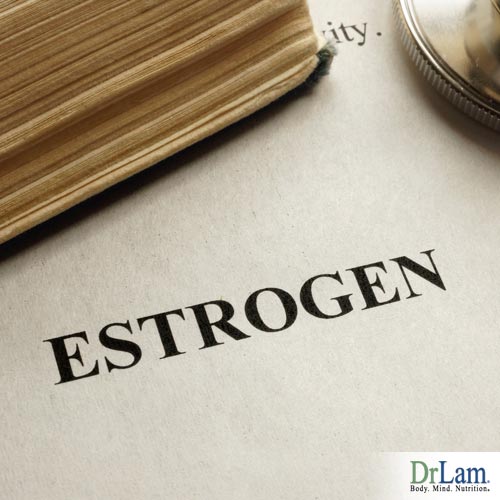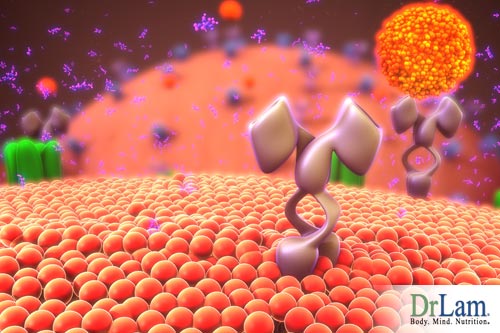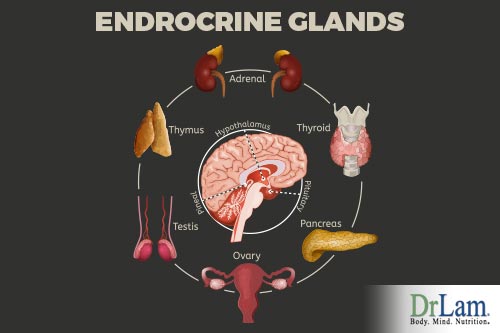 Reproductive hormones, like estrogen and testosterone, are often the most well known hormones. Estrogen, for example, is well known as the hormone one responsible for making the uterus lining thick so an egg can implant and for causing PMS symptoms. However, estrogen is only one of many endocrine hormones that perform a multitude of vital functions in the body throughout the lifespan. Endocrine hormones create a network that helps control a vast majority of your bodily functions. And it is important to take good care of this network.
Reproductive hormones, like estrogen and testosterone, are often the most well known hormones. Estrogen, for example, is well known as the hormone one responsible for making the uterus lining thick so an egg can implant and for causing PMS symptoms. However, estrogen is only one of many endocrine hormones that perform a multitude of vital functions in the body throughout the lifespan. Endocrine hormones create a network that helps control a vast majority of your bodily functions. And it is important to take good care of this network.
Many don’t know much about this part of the body. Yet the endocrine system is the network responsible for producing and releasing the hormones that have receptors on almost every organ, in every part of the body. These glands change calories into energy, empowering cells and organs to operate efficiently. They also play an important role in the heart’s rhythm and the growth of tissues and bones. Problems with the endocrine glands can lead to the development of diabetes, thyroid disease, and certain growth disorders.
The endocrine glands include:
Even the smallest malfunction in any of these glands can be powerful enough to change the balance of hormones in the body, leading to endocrine hormone disorders and diseases. Therefore, the operations of these endocrine systems and receptors are vitally important.
 All cell receptors, including the ones designated specifically for hormones, are proteins found on the inside and on the surface of cells throughout the body. These receptors act as the cell’s senses, receiving messages from substances in the bloodstream that give the cells directions on what to do.
All cell receptors, including the ones designated specifically for hormones, are proteins found on the inside and on the surface of cells throughout the body. These receptors act as the cell’s senses, receiving messages from substances in the bloodstream that give the cells directions on what to do.
The receptors act like a door lock. If a particular substance comes through the bloodstream that fits into the receptor, like a key into a lock, the door is opened, and activity begins in the cell.
Although completely necessary, receptors are not always acting for the betterment of the body. For example, just like healthy cells, most cancer cells also have receptors.
Many breast cancer cells have hormone receptors that respond to signals from hormones. An important part of cancer therapy is knowing whether the cancer cells have receptors or not.
With hormone receptor positive breast cancer cells, hormone therapy can interrupt the influence of hormones necessary for the growth and function of cells. If the hormone is blocked, the cancer cells are less likely to thrive. In addition, cells are constantly undergoing changes. Some breast cancer cells that are hormone receptor positive can lose receptors over time, and some that are hormone receptor negative can gain receptors. Therefore, it is common practice to repeat biopsies and retest cancers for hormone receptors. It is the primary determination regarding whether hormonal therapy may be helpful or not.
Because of the importance of endocrine hormones and their function in the human body, it is easy to see how a disruption in the system can cause disorders.
Endocrine disorders can be caused by:
Many endocrine lumps such as tumors and nodules are noncancerous and usually do not spread to other parts of the body. However, a tumor or nodule on a gland may interfere with that gland's hormone production.
Many types of endocrine disorders can result from hormone discrepancies.
 One of the most common, frequently misidentified, disorders associated with endocrine hormones is Adrenal Fatigue Syndrome (AFS). Many of the endocrine conditions described above closely resemble the symptoms of AFS, as they are interrelated. These conditions become a source of stress for the body that can cause it to activate its natural fight-or-flight response system.
One of the most common, frequently misidentified, disorders associated with endocrine hormones is Adrenal Fatigue Syndrome (AFS). Many of the endocrine conditions described above closely resemble the symptoms of AFS, as they are interrelated. These conditions become a source of stress for the body that can cause it to activate its natural fight-or-flight response system.
When the body is under stress, it activates the hypothalamic-pituitary-adrenal (HPA) axis. Upon activation, a number of hormones are secreted as the body is sent into fight or flight mode to respond to the stressor. One of the main hormones secreted by the adrenals in defense mode is cortisol. If stress on the body and the system continues unregulated, the overworked adrenal glands reach an exhaustion point and can no longer secrete cortisol properly. Eventually, the body’s ability to manage stress is disabled. This is a life threatening condition. Stress is a silent killer, and it can sneak upon the body in many different ways.
When the adrenal gland is exhausted, its ability to balance and produce other hormones is altered. Estrogen, progesterone, and testosterone are significantly reduced, and the imbalance often causes abnormal weight gain, fluctuations in blood pressure, cravings for certain types of food, and feeling fatigue, insomnia, brain fog, and low libido. The symptoms often worsen over time if the stress and endocrine hormone imbalances continue, eventually leading to a system wide shut down.
Metabolic dysfunctions and endocrine hormone problems can also trigger the inflammatory response. Digestion, and more specifically the gut microbiome, begins working ineffectively resulting in even more inflammation.
Chronic inflammation brought on by stress, sleep disruption, diet, metabolic irregularities, endocrine hormones, and problems in the gut microbiome is involved in a number of physical complications. For those who suffer from AFS, containing and identifying inflammation requires an understanding of the NeuroEndoMetabolic (NEM) Stress Response model.
If an endocrine disorder is suspected, a primary care doctor would most likely offer a referral to a specialist trained in endocrine hormones and the endocrine system, called an endocrinologist.
Though all symptoms of disorders involving the endocrine hormones vary widely depending on the gland or glands that are involved, the primary complaint is that of fatigue and weakness.
The initial test to determine whether or not an endocrine disorder exists in the body is done with a blood and urine analysis to check on existing hormone levels. Tests may also be conducted via imaging to locate or pinpoint any existing nodules or tumors in the body. Saliva tests are also useful to measure free hormones.
Addressing issues with endocrine hormones can be complicated. Changing one hormone level is known to affect another, and the process may require a series of tests and monitoring.
It is now known that the entire body’s system must be considered when seeking ways to address stress and endocrine hormone issues. Most conventional physicians are trained in a specialty area, leading them to divide up the body and only focus on their designated specialty area. However, the body’s systems are all intricately connected and work by communicating with each other. They are all affecting each other, and therefore need to be considered as a whole. What affects even the smallest organ or gland leads to a reaction in another system. An example of this that is gaining recognition is the NEM approach to the body’s stress response system.
 When the HPA axis is activated by any stressor, the hormone response system for stress is also activated. First, cortisol is released by the adrenals, followed by thyroid hormones, which are secreted or not secreted depending on the imbalance. This results in extreme fatigue, decreased libido, increased PMS symptoms, irregular menses, sleep disorders, and many other issues.
When the HPA axis is activated by any stressor, the hormone response system for stress is also activated. First, cortisol is released by the adrenals, followed by thyroid hormones, which are secreted or not secreted depending on the imbalance. This results in extreme fatigue, decreased libido, increased PMS symptoms, irregular menses, sleep disorders, and many other issues.
With continuing stress, thyroid function begins to deteriorate. The body’s metabolic rate changes to conserve energy. Warning signs of this metabolic dysregulation and endocrine hormone dysfunction are issued, and more symptoms begin to appear.
If you are considering the use of hormone replacement therapies for the endocrine system, it is important to know that there are many factors involved in therapy for the endocrine system, so it is important to consult with your doctor or alternative medicine practitioner first.
The endocrine system is intricate and requires balancing from all systems in the body. When disorders are recognized in any of them, proactive measures must be taken in more areas than just one. Optimal health requires a combination of elements, and it is wise to research a variety of health methods prior to implementing any of them.
The estrogen hormone, or what is most commonly known as the “female hormone” is the most important endocrine hormone, especially for women. With no estrogen, humanity cannot procreate.
